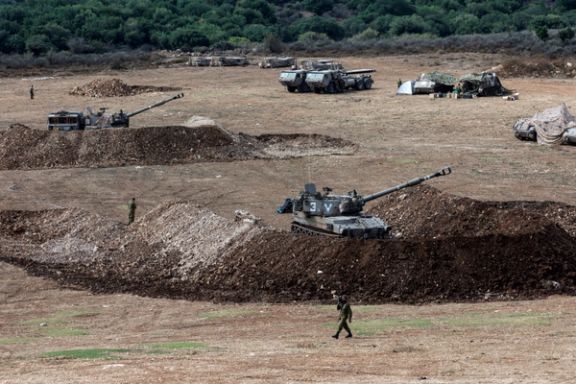Israel Launches Offensive In Response To Hamas Attack

The Israeli military has launched an offensive against the Gaza Strip in response to the devastating weekend attack by Hamas that killed hundreds of Israelis.

The Israeli military has launched an offensive against the Gaza Strip in response to the devastating weekend attack by Hamas that killed hundreds of Israelis.
The IDF said Monday that it had called up an unprecedented 300,000 reservists and was imposing a total blockade of the coastal sliver. After hours of intense bombardment by Israeli jets, the Iran-backed Islamist group, which controls Gaza, said it would execute Israeli captives and broadcast the footage.
Despite the US downplaying Tehran’s involvement in the attack, more and more reports are surfacing implicating the regime in the worst Palestinian attack on Israel in decades.
A White House spokesperson said on Monday that Iran is complicit even though the United States has no intelligence or evidence that points to Iran's direct participation in attacks. "Iran has long supported Hamas and other terrorist networks throughout the region with resources capabilities training," White House national security spokesperson John Kirby said on MSNBC. "And so in that regard, clearly, Iran is complicit here, but in terms of specific evidence on this, these sorts of attacks, no, we don't have anything.”
Many on social media have criticized the administration for its insistence of not having direct evidence, despite Hamas and Hezbollah officials admitting Tehran's support.
Israeli President Isaac Herzog has also said there is no evidence of Iran’s involvement, but other Israeli have noted that Iran is a key sponsor of Hamas, providing money, equipment and training.
“Initially, we didn’t think that they did. Now there’s some evidence that they might have known about it. We are working to verify that evidence,” Israeli Strategic Affairs Minister Ron Dermer said.
“Iran is involved, but a distinction must be made between the strategic aspect and the operational aspect,” said Major General Amos Yadlin, former head of the Israel Defense Forces’ Military Intelligence Directorate.
In an exclusive report on Sunday, the Wall Street Journal quoted senior unnamed Hamas and Hezbollah members, who said Iranian officials were involved in planning the large-scale operation and the final decision to launch the operation was made in Beirut October 2.
A senior Israeli government source told reporters Monday that Israel has indications that Iran pushed Hamas into carrying out its massive infiltration and deadly assault.
Iran is also pushing Hezbollah to be ready for conflict with Israel, the senior source added. Israel has warned Hezbollah against joining the war following Hezbollah's attacks on its bases at Syrian border regions. In a message delivered to Hezbollah leader Hassan Nasrallah through senior officials in the French government, Israel has threatened to destroy Damascus and may even consider eliminating Iran-backed Syrian President Bashar al-Assad.
Additionally, US warships will support Israel in such actions. US Defense Secretary Lloyd Austin said Saturday that US will send multiple warships and aircraft closer to Israel as a show of support. Israeli media outlet Ynet said that the White House is working to obtain approval from Congress to participate in a possible operation against Hezbollah.
Israeli troops "killed a number of armed suspects that infiltrated into Israeli territory from Lebanese territory", the military said, but a Hezbollah official denied that the group had mounted any operation into Israel.
Israel has not specified how long the war will last, but the senior source said it will continue for many days, perhaps many weeks, and possibly longer than that.
Some Hamas fighters were still holed up in several locations inside Israel on Monday evening, two days after they killed hundreds of Israelis and seized dozens of hostages in a raid that caught Israel by surprise. According to Israeli TV channels, the death toll from the Hamas attack had climbed to 900.
Abu Ubaida, the spokesman of the Izz ad-Din al-Qassam Brigades, the military wing of Hamas, said Israeli captives are kept safe in accordance with Islam, warning, however, that in return for every Israeli bombing of a civilian house without warning, it will begin executing an Israeli civilian captive and broadcast it.
In Gaza, Israel pressed on with its most intensive retaliatory strikes ever, which have killed more than 670 people since Saturday. Defense Minister Yoav Gallant announced a tightened blockade, which would prevent even food and fuel from reaching the strip, home to 2.3 million people. Israeli strikes have hit several Hamas security headquarters and ministries.
According to a cabinet member from Prime Minister Benjamin Netanyahu's Likud Party, a national unity government joined by opposition leaders will be set up. Netanyahu told mayors of southern towns hit by Saturday's surprise assault that Israel's response would "change the Middle East".
"The price the Gaza Strip will pay will be a very heavy one that will change reality for generations," Defense Minister Gallant said in Ofakim, one of the towns that had been attacked.
Hamas is just one of Iran-backed armed groups across the region, with their reach extending from Iraq and Syria to Lebanon and Yemen. In recent years, these proxy militias have carried out attacks on various fronts, including targeting US military facilities in Iraq, striking Aramco oil sites in Saudi Arabia, and conducting operations against commercial ships in the Persian Gulf.
"Hamas asked for war and it will get war," Netanyahu said Monday evening.